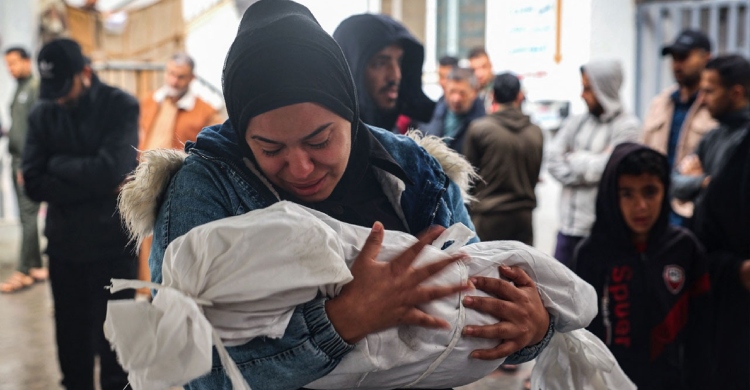Death toll climbs to 33 in some of the deadliest Israeli attacks in Gaza since the ceasefire began


Israeli airstrikes on the southern Gaza city of Khan Younis killed five people, according to hospital officials, bringing the number of fatalities over a roughly 12-hour span to 33. Most of those killed were women and children. These strikes are among the most lethal since the U.S.-mediated ceasefire went into effect on Oct. 10.
Israel said the latest wave of attacks followed gunfire directed at its forces in Khan Younis on Wednesday. No Israeli troops were killed, and the military said it responded with airstrikes.
Four strikes on tents housing displaced Palestinians in Khan Younis on Wednesday night and Thursday morning killed 17 people, including five children and five women, officials at Nasser Hospital reported.
In Gaza City, two airstrikes destroyed a building and left 16 people dead—among them seven children and three women—hospital officials at Al-Shifa said.
Hamas condemned the attacks, calling them a “horrific massacre,” and denied firing at Israeli soldiers.
Grief across Gaza
At Nasser Hospital, large crowds gathered to perform funeral prayers for the victims. Women cried over bodies wrapped in white shrouds.
Abir Abu Moustapha lost her three children—ages 1, 11 and 12—and her husband when their tent was struck on Wednesday. She knelt beside their bodies as they were prepared for burial.
“My children are gone. What can I possibly say? And my husband, the dearest to me. May God have mercy on them,” she said. “What did my children ever do? Why did they have to die in front of me?”
The Israeli military said the strikes were aimed at two Hamas members: a commander in the group’s naval forces and another responsible for overseeing tunnels in the Khan Younis area.
Ceasefire under strain
Hospital officials said victims came from both sides of the division created by last month’s ceasefire, which split Gaza and placed roughly half of the territory under military control.
The escalation followed the U.N. Security Council’s endorsement of U.S. President Donald Trump’s plan for Gaza’s governance and security. The proposal includes an international security force, a transitional governing body, and a pathway toward potential Palestinian statehood.
Hamas rejected the plan, arguing that the mandate—particularly the requirement of disarmament—undermines the force’s neutrality and aligns it with Israel.
Although Israeli strikes have decreased since the ceasefire began, they have not fully stopped.
Gaza’s Health Ministry, which does not separate civilian from combatant deaths, reports more than 300 fatalities since the truce started. Both Israel and Hamas accuse each other of violating the agreement, which includes increasing humanitarian aid deliveries and returning hostages—living or dead—to Israel.
Israel’s military campaign in Gaza has killed more than 69,000 Palestinians since it began more than two years ago in response to Hamas’ Oct. 7, 2023 assault on southern Israel, which left about 1,200 people dead and 251 kidnapped. The ministry’s casualty figures are considered credible by the U.N. and many independent experts.
Under the Oct. 10 ceasefire, Hamas released the remaining 20 living hostages in exchange for hundreds of Palestinian detainees. It has also returned the bodies of 25 deceased hostages and is expected to hand over three more.
Released Israeli hostage alleges sexual abuse
An Israeli hostage freed in the ceasefire deal said he was sexually assaulted while being held by Hamas.
Guy Gilboa-Dalal told Israel’s Channel 12 that after being allowed to shower, a captor forced him into a room, threw him onto a chair while he was naked, and molested him.
“I froze,” he said. “I told him, ‘This is forbidden in Islam.’ But he put a rifle to my head and a knife to my throat and warned me not to tell anyone.”
Channel 12 will broadcast the full interview on Saturday. Hamas officials have not yet responded to the allegation.
Another released hostage, Rom Braslavski, also reported sexual abuse.
Palestinians freed from Israeli prisons after being taken from Gaza during the war have described being stripped to their underwear, beaten by guards, subjected to sexual abuse, restrained for days—sometimes leading to infections and amputations—and denied adequate food and medical treatment.
